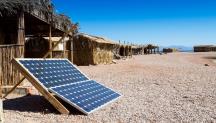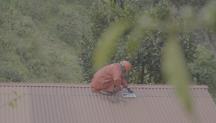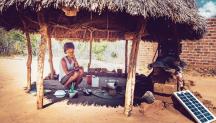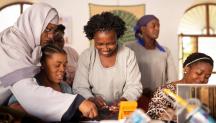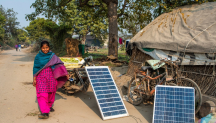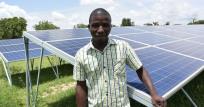
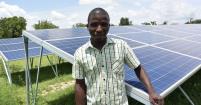
Renewable Energy in Burkina Faso: Improving Living Conditions and Alleviating Poverty
Newsletter
Burkina Faso’s economy is heavily reliant on energy imports. In 2013, 92% of the country’s electricity was imported or produced from imported oil and the country’s economy is particularly vulnerable to fluctuations in the price of oil. Burkina Faso is simultaneously facing challenges of energy access, energy security and climate change mitigation.
With no growth in electrification rates over the last few years, less than 5% of the rural population have access to electricity and many schools and hospitals lack supply. Rural communities rely on expensive and harmful kerosene, batteries, and candles to meet their basic energy needs and have no access to electricity to meet these needs or support income generating activities.

Mr. Jacques Konane at a solar PV installation in rural Burkina Faso.
“It is very difficult to live in an area without electricity in the 21st Century,” said electrical engineer Jacques Konane. Mr. Konane was contracted by the International Institute for Water and Environment to supervise the field implementation of hybrid solar photovoltaic (PV)-diesel plants in rural areas. “How can the students that go to these schools study efficiently in the evening. How can we store medication/vaccines in our pharmacies without power? People living in this village cannot run activities that generate revenue. Access to electricity will solve the problems of this community and improve the living conditions,” said Mr. Konane

For people like Mrs. Cabouret, who takes care of basic medical supplies in a rural village in Burkina Faso, access to electricity from a local solar PV plant for the village is essential.
Development-financed renewable energy projects focusing on electricity access for isolated rural areas have been put into place to support health and educational facilities. However, research shows that energy demand in Burkina Faso is increasing rapidly. To meet this demand, scaling-up renewable energy in the country’s current energy mix would not only improve access to electricity but also reduce the country's dependence on imported fossil fuels for electricity generation. Planning and coordination between the grid extension and the off-grid electrification programmes is essential for effective and sustainable supply of electricity at reduced cost. Improving access to electricity is a key component of the government’s strategic development plan.

Family living in rural Burkina Faso.
“Through electricity access, renewable energy projects will improve living conditions in rural areas. It will contribute to create economic activities, to improve access to health, education and culture, and eventually alleviate poverty,” said Yacouba Camara, Director-General, Electrification Development Fund (FDE), which is responsible for the implementation of Burkina Faso’s rural electrification policy.

Solar PV installation in rural Burkina Faso.
The FDE devised a special project to provide electricity to healthcare facilities and households in rural areas by matching the most suitable and cost-effective technology with each end user’s needs. For example, in densely populated rural trading areas, mini-grids have technical and economic advantage over grid connection and individual solar kits. In sparely populated areas, on the other hand, individual solar kits are the most cost-effective solution for households, while larger individual PV systems work best for businesses, schools and healthcare centres. The PV-based systems are an established, scalable and low-maintenance technology that was proven successful by earlier electrification projects across the region.
This model has high potential for replication in Burkina Faso and beyond due to its uniquely holistic, cost-effective approach to addressing needs of different groups of population: households will benefit from improved living conditions at affordable costs of electricity, small- and medium-size enterprises will gain stimulating economic activity and subsequent growth, and communities as a whole will benefit from improved infrastructure to support inclusive socio-economic development.
A similar project in Burkina Faso was selected for funding through the International Renewable Agency’s collaboration with the Abu Dhabi Fund for Development (ADFD). The work of the IRENA/ADFD Project Facility identifies and funds the development of renewable energy projects in developing countries. So far, the Fund has allocated USD 144 million of ADFD loans to 15 renewable energy projects recommended by IRENA. Over USD 189 million has been leveraged through other funding sources to cover the rest of the project costs.
The project application cycle opens on 11 November 2016. Please register at adfd if you wish to apply. Email adfd@irena.org with any questions.
